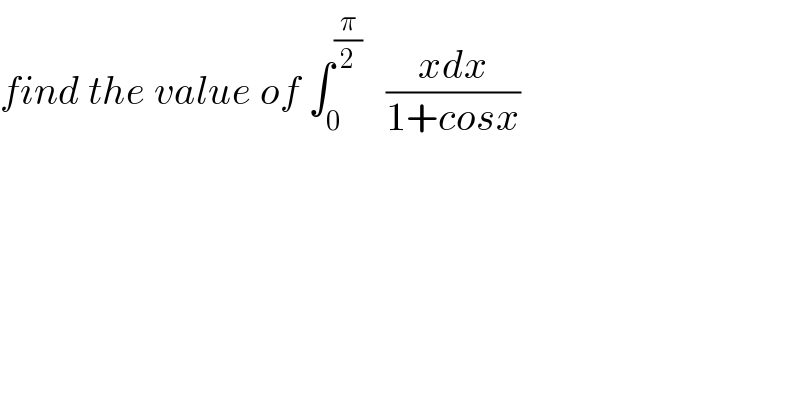
Question and Answers Forum
Question Number 37071 by math khazana by abdo last updated on 08/Jun/18

Commented by math khazana by abdo last updated on 10/Jun/18
![changement tan((x/2))=t give I = ∫_0 ^1 ((2arctan(t))/(1+((1−t^2 )/(1+t^2 )))) ((2dt)/(1+t^2 )) =4 ∫_0 ^1 ((arctan(t))/(1+t^2 +1−t^2 ))dt =2 ∫_0 ^1 arctan(t)dt and by parts I =2 { [t arctan(t)]_0 ^1 −∫_0 ^1 (t/(1+t^2 ))dt} =2{ (π/4) −(1/2)[ln(1+t^2 )]_0 ^1 } =(π/2) −ln(2) ★ I =(π/2) −ln(2)★](Q37169.png)
Answered by tanmay.chaudhury50@gmail.com last updated on 09/Jun/18
![∫_0 ^(Π/2) (x/(2cos^2 (x/2)))dx (1/2)∫_0 ^(Π/2) ((xsec^2 (x/2))/)dx let I_1 =∫xsec^2 (x/2)dx =x∫sec^2 (x/2)dx−∫[(dx/dx)∫sec^2 (x/2)dx]dx =x((tan(x/2))/(1/2))−∫((tan(x/2))/(1/2))dx =x×2tan(x/2)−4ln∣sec(x/2)∣ so required ans is (1/2){2xtan(x/2)−4ln∣sec(x/2)∣}_0 ^(Π/2) =(1/2)[{2×(Π/2)×1−4ln((√2) )}−{2×0×0−4ln1}] =(Π/2)−2×(1/2)ln2 =(Π/2)−ln2](Q37107.png)
Commented by math khazana by abdo last updated on 10/Jun/18

Answered by MJS last updated on 10/Jun/18
![∫(x/(1+cos x))dx= [((∫u′v=uv−∫uv′)),((u′=(1/(1+cos x)) ⇒ u=((sin x)/(1+cos x)))),(( [((u=∫(dx/(1+cos x))=∫((tan (x/2))/(sin x))dx=)),(( [t=(x/2) → dx=2dt])),((=2∫((tan t)/(sin 2t))dt=∫((tan t)/(sin t cos t))dt=∫sec^2 t dt=)),((=tan t=tan (x/2)=((sin x)/(1+cos x)))) ])),((v=x ⇒ v′=1)) ] =((xsin x)/(1+cos x))−∫((sin x)/(1+cos x))dx= [t=1+cos x → dx=−(dt/(sin x))] =((xsin x)/(1+cos x))+∫(dt/t)=((xsin x)/(1+cos x))+ln t= =((xsin x)/(1+cos x))+ln(1+cos x)+C](Q37197.png)
